| "The
Lehman Trilogy"
Absolute theatre magic!
 |
| Photo by Stephanie
Berger. |
From
22 March to 20 April, 2019.
Mon. – Thurs. at 7 PM; Fri. – Sat. at 7:30 PM; Sat.
at 1 PM.
Park Avenue Armory, 643 Park Avenue, NYC.
Tickets: $45-$1256; online https://www.viagogo.com/Theater-Tickets/Theater/The-Lehman-Trilogy-Tickets/E-3401868.
"The Lehman Trilogy" by Stefano Massini, adapted by Ben
Power. Directed by Sam Mendes.
Reviewed by Glenda Frank.
"The Lehman Trilogy," in a limited run at
the New York Armory, is almost four hours long and features three
actors in a glasslike cage. What can you expect from this? Absolute
theatre magic! The production, directed by Sam Mendes ("American
Beauty"), is mesmerizing.
The trilogy tells the story of the three generations of the family
that built the financial behemoth, which folded in 2008. The giant
transparent cubicle (Es Devlin, set design) revolves to provide
various interiors. The pictorial backdrop (Luke Halls, video design)
sets the scenes, changing for place and time, even for major events
like the cotton fire that devastated Alabama in the 1850s. And the
reflecting floor (Jon Clark, lighting) makes the whole seem –
at times -- to be floating in a high rise far above the city.
The three actors who play a multitude of genders and ages, tap
our imaginations in ways that are more than impressive. When Simon
Beal (named the greatest stage actor of his generation), a stout,
bearded man of a certain age, transforms into a slender young woman
being courted by one of the original Lehman brothers, we witness
the courtship. The limited number of actors and sets keeps our minds
focused on (fascinated by!) the story of the family. Lines repeat,
like an incantation.
Characterization is quick and vivid. We are reminded at key moments
that Henry Lehman, the oldest Lehman brother, is the Head. He makes
the decision. Emanuel (Ben Miles, Tony nomination for "Wolf
Hall") is the Shoulder; he carries them out. And Mendel (Adam
Godly, Tony and Drama Desk awards nominations for "Anything
Goes"), the youngest, is the Potato, smooth, a peace zone between
the two brothers – who they discover has some brilliant ideas
of his own. The men first sell to Straw Hats (Alabama locals) but
as business grows, they sell to the Big Cigars and later strike
up a lucrative bargain with Perfect Hands, a wealthy factory owner
in the North.
 |
| Photo by Stephanie Berger. |
The actors are clad in modern dress and somber colors. While the
several rooms in the cube contain tables and chairs, seating arrangments
change by rearranging storage boxes. (The boxes are also a reminder
of the root of the family's success, the store in Alabama.) Move
the boxes and you have the interior of a coach. Move them again,
and the father, on the taller stack, sits with his son and the son
plays with his invisible beard. The concept is not new but on this
scale – a trilogy in the Armory – it is daring and exciting.
The audience is tapped as an important aspect of this creative process.
The trilogy consists of "Three Brothers," "Fathers
& Sons," and "The Immortal" (about the company).
"Three Brothers" is a paean to the immigrant experience
and the American dream. Its format is story theatre: much direct
address to the audience. It begins with a dream of "the magic
music box called America" -- the dream of Henry Lehman, son
of a cattle merchant in Rimpar, Bavaria. The 45-day passage is transformative.
The teetotalling boy becomes an expert drinker, who can distinguish
not just various liquors but the quality of his drink. The boy who
never gambled arrives adept at dice and cards. And so, open to change,
he embraces the multiplicity of New York, but moves to Montgomery,
Alabama, to open his shop. He hand paints his own shop sign. The
sign is continually repainted by the brothers as the business grows.
"A can of paint on the sidewalk" is one of several refrains,
which evokes family history with a light, almost self-deprecating
comic touch.
Once his two brothers arrive, the action speeds up. The fraternal
battles are lively as the Lehmans change direction and struggle
with a steep learning curve. Idea begets idea. Henry ("who
is always right") decides to add seed and farm tools to the
inventory. Emanuel balks, so the brothers canvass the farmers to
learn if there is a need. They begin to accept raw cotton as payment,
but selling the cotton yields a small profit. (Yes, during slavery.
They were not social pioneers.) After a visit to a New York cotton
exchange, they learn how to make the transport of cotton profitable
and they create a new profession – middlemen.
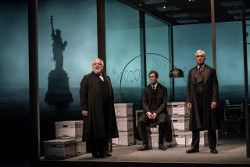 |
| Photo by Stephanie Berger. |
They are businessmen and their courtships are based on that paradigm.
Emanuel marries a Southern belle -- for love. He is so infatuated
that he makes bookkeeping errors. Wed to the business, Mayer, the
youngest brother, decides which alliance would make him happy and
presents himself. Unlike his older brother, he does not court her,
not in the traditional sense. He appears at her door and proposes
24 times and finalizes the wedding date with her father. Phillip,
Emanuel's son, draws up a list of eligible women, assesses their
strengths, then proposes.
The trilogy is filled with comical and quirky touches, all intrinsic
to the characters. Herbert Lehman, who is upset because his sisters
are not treated as equal to his brothers, is discovered to be a
poor fit for the business. He becomes the 45 Governor of New York
(1933 -1942) and a US Senator (1949 – 1957). Philip Lehman,
who runs the company as it transitions from a commodities house
to a house of issue, feels in constant competition with his more
famous brother. A tightrope walker on Wall Street becomes a metaphor
for the high-risk trading world. Words (like "shares")
have replaced objects (like tons of cotton) in their business dealings.
The story of Noah and the ark becomes a cautionary tale for running
the company, even as they market the self-serving slogan that buying
is winning.
The play ends where it began, with the three brothers, the small
shop in Montgomery, and the dream. Toward the end, the trilogy takes
on a moral tone. The family has lost its values. In the end, the
company is controlled by strangers. Henry, the eldest brother, closed
the dry-goods shop on Shabbat (Saturday) but opened it on Sunday.
When Henry died, the brothers observed the Jewish traditions of
mourning; they sat shiva for seven days and tore their suits. In
the next generation, they mourned a death for three days. And in
the third generation, three minutes. The first and second generations
married for life. Bobbie Lehman, the third generation, was divorced
twice. The immigrant saga becomes the contemporary American story.
"The Lehman Trilogy" covers 150 years of western capitalism.
It was written by Stefano Massini and first performed in Paris is
2013. The 2015 staging by Luca Ronconi in Milan captured international
attention and has enjoyed multiple stagings throughout Europe. The
English version has been adapted by Ben Power, Deputy Artistic Director
of the National Theatre, where this version of the plays premiered.
"The Lehman Trilogy" a fascinating
family tale misses financial corruption
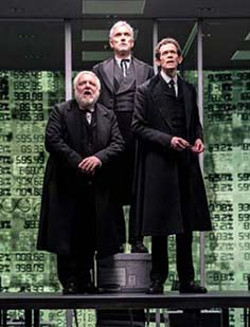 |
| L-R: Simon Russell Beale as Henry
Lehman, Ben Miles as Emanuel Lehman, Adam Godley as Mayer Lehman.
Photo by Stephanie Berger. |
Written
by Stefano Massini, adapted by Ben Power, directed by Sam Mendes.
Produced by the National Theatre and Neal Street Productions, in
collaboration with Park Avenue Armory.
(212) 933-5812; http://armoryonpark.org/programs_events/detail/lehman.
Opened March 22 , closes April 20, 2019.
Running time 3:20.
$45 rush tickets on day of performance at the Box Office beginning
12pm (two per person).
Reviewed
by Lucy Komisar.
Truth and a bit of fantasy. A quite extraordinary play of how generations
of an immigrant family create a major financial institution that
starts as a southern cotton farming supply shop and ends as a multinational
bank whose crash helps bring on the Great Recession of 2008.
It attempts to tell the story of western capitalism through the
fortunes of this very industrious and far-sighted family. Unfortunately,
the choice to present this as largely a family story misses the
financial politics that would demonstrate that this is not just
about three immigrant brothers from Germany and their progeny, but
about the systemic corruption of the US and international financial
system.
The play by the British Ben Power is based on a work by the Italian
Stefano Massini and staged by the accomplished British director
Sam Mendes. So, perhaps they are not grounded in US financial history.
And they particularly could not establish links between the corruption-fueled
Depression and the collapse of the Lehman bank in 2008.
As a piece of theater, this is brilliant, fascinating. The brothers
and their sons down the line (where are the women?) are played powerfully
by Simon Russell Beale, Adam Godley, and Ben Miles. Arriving in
Alabama in the mid-1840s, they go from running a farming supplies
shop to moving cotton to the north. Then they establish a bank.
We know that slavery was the economic foundation of the cotton south,
and then of the financial system built on it. It was a building
block of the American economy. The Lehmans in fact owned slaves.
But this is not about slavery, which doesn’t appear to raise
any moral problems among the clan.
The next big flaw is the treatment of the 1929 crash, when we see
the suicides of ten or more stock traders, each described in detail,
but not a word about the Pecora Report, that famous investigation
of the time which told how the men who ran Wall Street were corrupt
manipulators who brought the system down.
The scenes occur in a brilliantly clever set of a rotating glass
square by Es Devlin, with video of changing backdrops by Luke Halls.
But I’m an investigative journalist as well as a theater critic,
and for me the story counts more than the visuals.
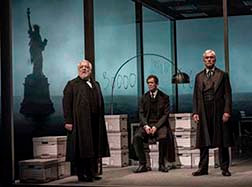 |
| L-R: Simon Russell Beale, Adam
Godley, and Ben Miles, immigrants, an office view of the Statue
of Liberty. Photo by Stephanie Berger. |
Henry Lehman, born 1822, had been dreaming of America.
He makes the passage in 1844 and goes to Alabama. His brothers Emanuel
(Ben Miles) and Mayer (Adam Godley) arrive a few years later. They
move from dry goods to what is needed for growing cotton. There’s
a terrific drama of plantations on fire, the need for their services
to rebuild — seeds, tools, to be paid for in raw cotton the
Lehmans will resell up north.
The glass square turns as time goes on. Through the south, they
are the middlemen, brokers. Brother Emanuel goes to New York where
the real money works. A point is made of their Jewishness, but that
mostly deals with business – they can't get into some, they
have an advantage in others.
Henry dies of yellow fever. The family continues, expands its business.
We learn how Lehman Brothers Cotton moves to financing railroads
and becomes Lehman Brothers Bank when the government of Alabama
subsidies it. It’s now known as crony capitalism or socialism
for the rich. The bank will move to Wall Street as industrialization
puts down strong roots and will become an investment bank.
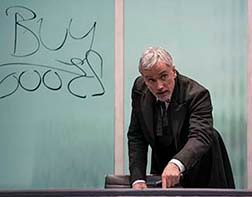 |
| Ben Miles as a trader. Photo by
Stephanie Berger. |
The glass office is gorgeous, now with a brown leather couch, corporate
conference table, and file boxes that bespeak Germanic organization.
The surrounding buildings get taller. Philip who takes over in 1887
wants to finance a Panama Canal. Wants to turn Lehman Bank into
Lehman Finance. Ah, the financialization of the global banking system.
A son Robert who comes to the bank in 1925 goes to Yale and turns
to Wall Street.
There are comic scenes with the wives (Adam Godley is good as the
cartoonish women), but there are no real women’s roles. The
younger men have modern business school voices, but it’s hard
to tell them apart. And then the 1929 crash. People demand their
money. Stock brokers and investors jump out of windows. Investment
funds are at zero. Banks are closing. What if everyone stops believing?
The really admirable Lehman is Mayer’s son Herbert, who leaves
the firm. He becomes New York’s governor 1933-47 and US Senator
1949-57. He says, "Grabbing and greed can go on for just so
long, but the breaking point is bound to come sometime."
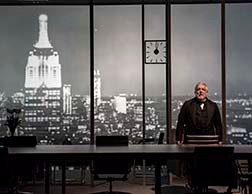 |
Simon Russell Beale as one of the
last of the Lehmans running the bank,. Photo by Stephanie Berger.
|
But the Lehmans and the firm don’t stop believing,
or find it useful to believe, and the author doesn’t mention
the Pecora investigation that exposes internal market corruption.
Time moves to the near present. A Lehman, Robert, will run the bank
for the last time, till 1969.
Pete Peterson, who had been Richard Nixon’s commerce secretary,
takes the top job. Then he is bought out by American Express, and
Dick Fuld takes charge. And comes the 2008 crash. Hank Paulson,
the Treasury head who had come from Goldman Sachs, bails out Goldman
but refuses Lehman. It’s called insider corruption.
Adapter Ben Power writes that through the family and "the hubristic
tragedy of 2008" we can see "where we are and how we got
there."
The personal stories and the fine acting link events together, but
not well enough to inform anyone in the audience who already doesn’t
know "how we got there": the story of the corrupt financialization
and government cronyism benefiting the favored banks and squashing
the others. Not to mention the government’s failure to act
to protect 7 million Americans who lose their homes as the result
of banks’ corrupt mortgage operations, so brazen that they
include "losing" documents that show people paid off their
mortgages and going to court to foreclose on their homes. Or the
millions who lose jobs.
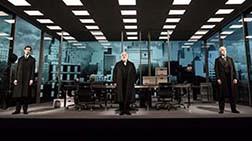 |
L-R:Adam Godley, Simon Russell
Beale, and Ben Miles, Photo by Stephanie Berger.
|
The play focuses on the building of a financial empire. The cast is
superb, and Mendes is a very fine director. The missing story is
how that empire and others like it crash the world financial system,
destroy lives, while in the case of Lehman Brothers Finance, it
is destroyed itself. The real dénouement is how Lehman’s
competitors with better political connections use their control
of big governments to bail themselves out and continue as financial
predators.
Visit Lucy’s website http://thekomisarscoop.com/
|









